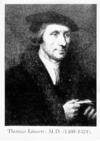 "At last," sigh our faithful readers, "a physician appears in the Who's Who." Heretofore we've featured diplomats, lawyers, mayors, professional scholars, but this is our first physician.
"At last," sigh our faithful readers, "a physician appears in the Who's Who." Heretofore we've featured diplomats, lawyers, mayors, professional scholars, but this is our first physician.
All biographical information from the entry in the Catholic Encyclopedia.
Thomas Linacre was born in London in c. 1460 and died in 1524. Linacre came from a poor family, and was educated at the monastery school of Christ Church in Canterbury, presided over by William Selling, who is widely acknowledged as the first serious purveyor of the studia humanitatis. Linacre attended Oxford, and was elected a fellow of All Souls College in 1484. In the best tradition of the humanists, Linacre quickly distinguished himself in Greek, and accompanied Selling on a trip to Rome at the behest of Henry VII. While in Rome, Linacre met Lorenzo de Medici,and continued his study of Greek and Latin with Florentine humanists like Poliziano.
In addition, Linacre, who ended up spending a decade in Italy, studied medicine at Vicenza and Padua. After returning to England, Linacre practiced for roughly eleven years, earning the trust of cardinals, bishops, and King Henry VIII himself. He also became the personal physician and close friend of Sir Thomas More -- no mean figure in the history of the humanities himself -- and retired from his position as the king's personal physician in 1520 to join the cloth.
Having amassed a considerable fortune as a result of his medical practice, Linacre donated much of it to establish chairs of Greek medicine at Oxford and Cambridge, and established a charter for the Royal College of Physicians, the latter of which is still considered the keystone document of the RCP. The RCP is the oldest of its kind in the English-speaking world.
Again in the best traditions of the humanists, who returned to the ancient sources, Linacre translated Galen's corpus from Greek into Latin, and was said by Erasmus (another friend) to have better Latin than Galen had Greek.
What relevance does Linacre have for the medical humanist?
Linacre is the quintessential physician-humanist. Learned in Greek and Latin, he emulated the ideal of the humanists, to use classical learning in the service of virtue, and he saw the return to Galenic medicine as the means to standardize medical practice of the time. He also hoped to use the professionalization of medicine primarily for the benefit of his patients, which, as Starr demonstrates, is not always the first priority of professional (organizational) behavior. He was trusted by clergy and lay alike, and he has continued to exert a lasting influence on medical practice to the present.
Importantly, the value of looking to Linacre are not a function of the validity of his clinical beliefs. That is, no contemporary physician would recommend treatment based on the Galenic model, and yet there is no doubt both that Linacre was crucially important both as a physician and as a humanist. The lesson here is Charles Rosenberg's, who reminds that there is a much larger social context to the question of whether a given treatment "works" than whether it produces clinical benefit. Hopefully, I will explore this last idea in other posts, though interested parties can read Rosenberg's argument in at least two collections.


Comments